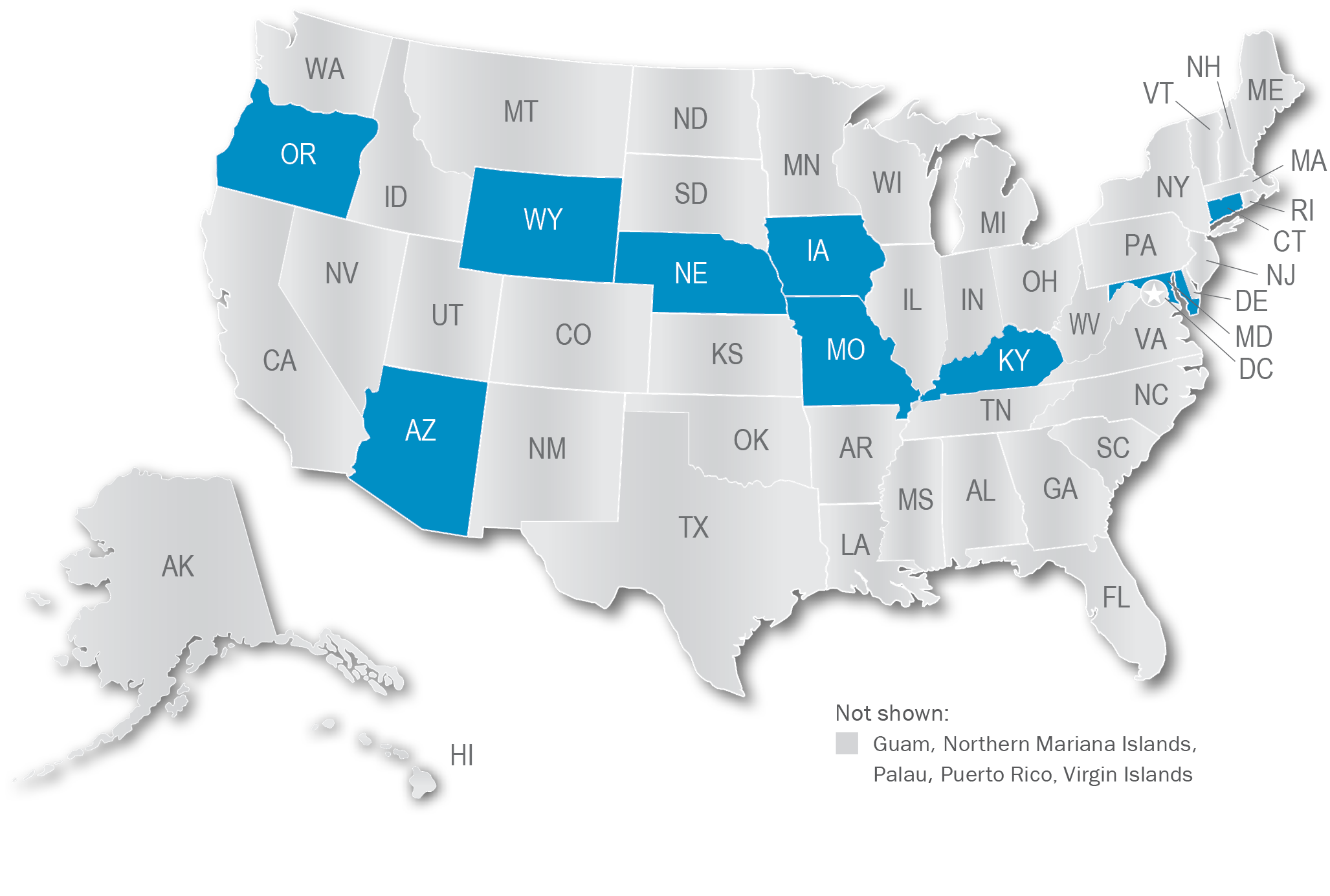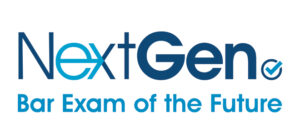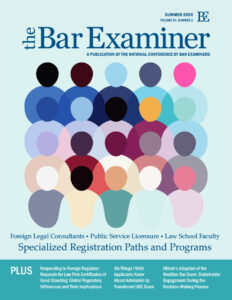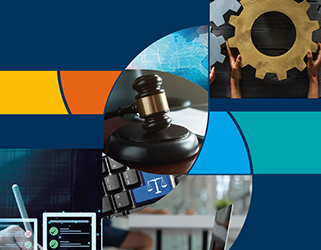This article originally appeared in The Bar Examiner print edition, Fall 2023 (Vol. 92, No. 3), pp. 32–34.
By Marilyn J. Wellington
Moving Forward with the NextGen Exam Structure and Testing Transition
As the NextGen bar exam moves toward its final stages of development, NCBE has adjusted the exam content and plan and has started to share more descriptive information to provide a clearer picture of the exam and details of the upcoming transition to NextGen.
As NCBE develops this exam to more closely reflect the practice of law, the NextGen exam will expand the lawyering skills tested to include legal research and writing, client relationship and management, client counseling and advising, investigation and evaluation, negotiation and dispute resolution, and, of course, issue spotting and analysis. These skill areas will be tested in the context of the application of doctrinal knowledge, with the foundational doctrinal areas included on this exam being real property, contracts, business associations, constitutional law, civil procedure, evidence, torts, criminal law, and—starting in July 2028—family law. Family law was recently added to this list as a result of a groundswell of encouragement by judges and justices of states’ highest courts nationwide who see this doctrinal knowledge area as critically important to successful entry-level practice.
Clarifying NextGen Length and Structure
As a reminder, the current Uniform Bar Exam (UBE) is administered over the course of two full days—6 hours each day, for a total of 12 hours of testing; the exam comes in four distinct 3-hour blocks—one block comprising the Multistate Essay Exam (MEE), a second for the Multistate Performance Test (MPT), and two blocks of the multiple-choice Multistate Bar Exam (MBE). Some jurisdictions substitute their own essay questions or performance tests for some or all of the MEE and MPT items NCBE offers; others include an additional jurisdiction-specific component outside the 12-hour testing window.
Late this summer, NCBE released information about the length and structure of the NextGen exam. It will consist of three blocks of 3 hours each, for a total of 9 hours of testing over a day and a half. We accomplish this reduction in testing time with an exam design that is more efficient in measuring examinee readiness to enter the practice of law. The shift from 12 to 9 hours of testing will bring multiple benefits, including allowing jurisdictions a window on the second testing day to administer a local exam to be scaled to the NextGen exam, in the same manner that some jurisdictions now scale a local exam to the MBE. For other jurisdictions, it offers the possibility of administering a separate and distinct local law component test.
In my previous column,1 I discussed the release of sample questions2 that illustrate two of the three question types—multiple-choice questions, integrated question sets, and performance tasks—that will appear on the new exam. Unlike the current exam, which is subdivided by type of question, the NextGen exam will feature a mix of all three question types in each of its 3-hour sections, providing a balanced and integrated experience for examinees throughout the exam. Specifically, each section will include two integrated question sets, one performance task, and approximately 40 multiple-choice questions, requiring examinees to exhibit their knowledge of doctrinal law and their ability to use critical legal skills to apply that knowledge in practice-like scenarios.
The NextGen exam will have several item types that are similar to those used on the current exam, including some MBE-like multiple-choice questions; these will appear throughout, as will others in differing formats that better reflect practice readiness. Performance tasks like those on the current MPT will also be included. Of the question types on the new exam, multiple-choice questions are no doubt the most familiar to many of us. They are the workhorses of high-stakes testing, allowing us to efficiently collect a large amount of information about examinees’ knowledge and skills in a relatively short period of time compared to their essay or performance counterparts. Imagine how long it would take to answer—and grade—100 essay questions.
One new question type we are particularly excited about is a multiple-choice question—sometimes called “multiple-select”—in which examinees will be given six answer options rather than the traditional four and will then be required to choose two correct answers rather than the traditional one. This new type of question is not just a minor variation on the standard four-option version. To receive full credit for their response, an examinee must select both correct answers; it may be easier to think of it as a question that requires a two-part answer. These questions allow for more complex responses that better reflect the realities of practice (for example, there is rarely only one legal topic at issue in a case). They also provide more nuanced and valuable information about the examinee’s knowledge and skills, depending on whether the examinee chooses only one of the correct answers, both of them, or none.
The Testing Transition and First NextGen Jurisdictions
It’s important to know that there will be a transition period during which both the NextGen and the current exams will be available to jurisdictions. Both exams will be available for jurisdictions to choose for four full administrations: July 2026, February 2027, July 2027, and February 2028. For administrations after February 2028, only the NextGen exam will be available. (The Multistate Professional Responsibility Examination, or MPRE, will not be affected by these changes.)
The NextGen exam has already been officially adopted in 9 jurisdictions, with Maryland, Missouri, and Oregon announcing a July 2026 inaugural administration of the NextGen exam, Arizona, Iowa, Kentucky, Nebraska, and Wyoming announcing a first administration in July 2027, and Connecticut announcing its adoption of the NextGen exam with a first administration on a date to be determined. Each jurisdiction, of course, has its own timeline and decision-making process for determining what approach will best meet its needs. I have been glad to have the opportunity to speak with many high-court justices, boards of bar admissions, bar administrators, and law faculty about the NextGen exam, and we are happy to continue to provide information and resources to any jurisdiction as they continue to make their decisions.
Finally, as this issue of the Bar Examiner goes to press, NCBE is on the cusp of announcing the technology partner that will help make delivery and grading for the NextGen exam a reality. I look forward to sharing further updates in my next column.

Nine jurisdictions have announced their intent to adopt the NextGen bar exam, which will be available to administer beginning in July 2026. Maryland, Missouri, and Oregon intend to first administer the exam in July 2026; Arizona, Iowa, Kentucky, Nebraska, and Wyoming plan to hold their first administration in July 2027. Connecticut has not yet finalized its first administration date.
Notes
- Marilyn J. Wellington, “The Next Generation of the Bar Exam: Quarterly Update: Taking Stock and Taking Shape: NextGen Content Scope and Initial Sample Questions,” 92(2) The Bar Examiner 6–8 (Summer 2023), https://thebarexaminer.ncbex.org/article/summer-2023/next-generation-of-the-bar-exam-sum23/. (Go back)
- For the initial batch of sample questions, see https://nextgenbarexam.ncbex.org/nextgen-sample-questions/. (Go back)
 Marilyn J. Wellington is the Chief Strategy and Operations Officer for the National Conference of Bar Examiners.
Marilyn J. Wellington is the Chief Strategy and Operations Officer for the National Conference of Bar Examiners.
Visit the NextGen Website
CONTENT SCOPE: nextgenbarexam.ncbex.org/reports/ content-scope
SAMPLE QUESTIONS: nextgenbarexam.ncbex.org/nextgen-sample-questions/
To stay up to date on development of the future bar exam, subscribe to updates at nextgenbarexam.ncbex.org/subscribe.
About the Next Generation of the Bar Exam
Set to debut in July 2026, the NextGen bar exam will test a broad range of foundational lawyering skills, utilizing a focused set of clearly identified fundamental legal concepts and principles needed in today’s practice of law. The skills and concepts to be tested were developed through a multiyear, nationwide legal practice analysis, focused on the most important knowledge and skills for newly licensed lawyers. Designed to balance the skills and knowledge needed in litigation and transactional legal practice, the exam will reflect many of the key changes that law schools are making today. NCBE is committed to ensuring a systematic, transparent, and collaborative implementation process, informed by input from and participation by stakeholders, and guided by best practices and the professional standards for high-stakes testing.
For more information, visit nextgenbarexam.ncbex.org/.

Contact us to request a pdf file of the original article as it appeared in the print edition.








